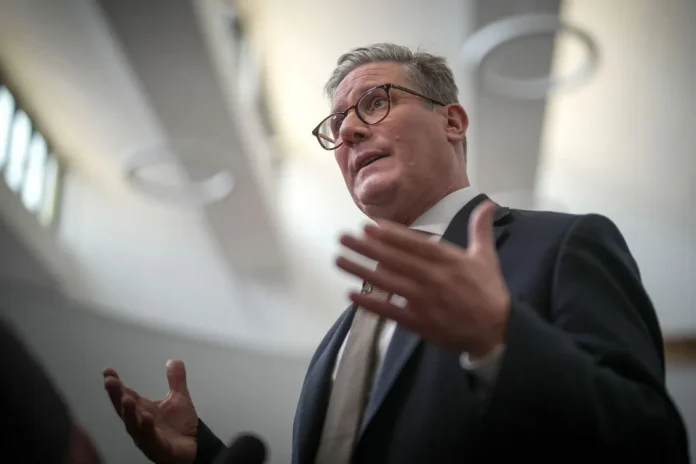UK Labour Party leader Keir Starmer could become prime minister in the United Kingdom’s general election, according to Politico.
Polls predict he could win the July 4 election. Then a summit marking NATO’s 75th anniversary will give him the opportunity to meet with US President Joe Biden.
It will be Starmer’s first step in a new “special relationship” with his US counterparts. While it remains unclear whether Biden will stay in the White House next year or whether a convicted Donald Trump will take the seat, the Labour leader will have to walk a diplomatic tightrope.
US Secretary of State Antony Blinken and Defence Secretary Lloyd Austin will also attend the NATO summit. They are expected to meet with the new (if the Labour Party wins) Defence Minister John Healey. The Labour has already backed the UK and US arming and striking Houthi missiles targeting ships in the Red Sea.
A day after the NATO summit officially opens on July 10, Trump will be sentenced on 34 charges of falsifying business records. On July 15, Republicans meet to approve him as their presidential nominee. However, Keir Starmer called it “an unprecedented situation.”
We will work with whoever is elected … We have a special relationship with the US that transcends whoever the president is.
Searching for ambassador
If Starmer wins the election, he will have to decide whether to keep David Lammy as shadow foreign secretary. At the same time, the Conservatives are preparing to exploit what they see as Lammy’s weaknesses, including voting against the resumption of Britain’s Trident nuclear weapons programme in 2016. However, some government sources claim he is capable of engaging in constructive dialogue with the US government.
He can talk to Americans in their own way.
Perhaps an even more important decision will be who to appoint as the UK’s ambassador to Washington, especially if Trump wins in November. Karen Pierce expects to leave the post around the time of the presidential inauguration in January.
She’s such a character, she could sometimes have a conversation with [Trump] where some of your more straight-laced diplomats necessarily wouldn’t cut through.
The position was offered to Tim Barrow, a former Brexit negotiator and retiring national security adviser. However, Cameron laughed off press speculation that he might get the position.
IRA deal
The most important question for the US is what Labour’s future foreign policy will look like. The party maintains the UK’s existing positions on Ukraine and the Houthi attacks on shipping. It also supports UK-US strikes against Iranian drones fired towards Israel.
Lammy, for her part, points to “progressive realism” and “securonomics.” The former version is the recognition that a centre-left government will have to do business with countries with which it disagrees. The latter, a version of shadow chancellor Rachel Reeves’s “Bidenomics” with far less public funding, has an “active state,” working with the market to incentivise supply chains in the UK.
The Labour Party pledged to focus on the supply chain for critical minerals vital for electric car batteries. The move aims to be less reliant on China through a so-called “buyers’ club” of countries in a global “clean power alliance.” The UK and US have already signed the Atlantic Declaration, which includes working together on critical minerals, in June last year.
Defence spending issue
Starmer’s former policy director Claire Ainsley argued that Labour would give this special relationship a “fresh start” regardless of who became president. However, not all differences will necessarily be favoured in the White House, whoever it is.
Keir Starmer and Lammy will take a cautious line on China, even without a Trump presidency. Lammy stated that it is “in everyone’s interest that China’s relationship with the West endure and evolve.” However, O’Sullivan disputed this statement.
Where we define China as an ‘epoch-defining challenge,’ there’s a bipartisan consensus in the US that they are an adversary.
The bigger impact on the special relationship is likely to be for Washington to shift its wider attention to Beijing. Labour will face domestic pressure to set a date for its desire to raise defence spending to 2.5 per cent of GDP.
Britain’s spending is already above the NATO target of 2 per cent, but the ruling Conservatives have set a deadline of 2030. The Labour Party has described the pledge as costly.
Unpredictability vs. calculation
Like Biden in the States, Starmer balances the pressures of diplomacy with the pro-Palestinian views of the more disillusioned sections of his electorate. The Labour Party lost control of a number of English councils last month after local politicians left the party over his refusal to condemn more strongly the Israeli bombing of the Gaza Strip. Starmer has said he wants to recognise a Palestinian state, but only as part of the process towards peace.
Ultimately, it is impossible to predict with any clarity how a Labour government will engage with the US after November. This is partly because Trump is so unpredictable, a stark contrast to Starmer’s bureaucratic approach to policymaking. Sophia Gaston, head of foreign policy at the Policy Exchange think tank, stated:
It is true that, should Keir Starmer and President Trump both win their elections, the deep alignment we have seen … may come under strain in future. But it is by no means a foregone conclusion. In a strange way, both Starmer and Trump have demonstrated a degree of political ruthlessness and positional flexibility to secure power.
